| |
|
|
Book Launching Ceremony
The Light of Guidance
English Translation of
Haḍrat Sultan Bahoo's Persian Book
Nūr-ul-Hudā
Organised By
MUSLIM Institute (Lahore)
|
|






|
|
MUSLIM Institute organized the launching ceremony of the English translation of Haḍrat Sultan Bahoo ‘The Light of Guidance (Nūr-ul-Hudā)' on Thursday February 28, 2019 at Aiwan-e-Quaid Lahore. The book is translated by Mr. M. A. Khan, foreword by Prof. Dr. Gerhard Bowering (Yale University USA), and published by Al-Arifeen Publications. Mr. Asif Tanveer Awan Advocate (Public Relations Officer, MUSLIM Institute) moderated the proceedings of the ceremony.
Brief Remarks of the speakers during the ceremony is as follow:
|
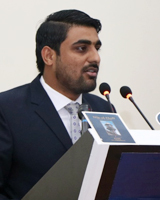
|
Opening Remarks
Ahmad Al-Qadri
Research associate, MUSLIM Institute
|
|
In the era of Haḍrat Sultan Bahoo, the very society was divided politically, socially and religiously, in fact, it fell a prey to bigotry. Haḍrat Sultan Bahoo started his mission to transform the basic unit of a society- an individual- and taught him to purify his heart of all evils. ‘Nūr-ul-Hudā’ is among one of his 140 famous books. Its translation went through five long years in which a depth and thorough study was made to translate it into English. Due to the mighty struggle and efforts rendered for this job, this translation secures an eminent distinction among other Sufi translations. It is a unique book of its kind which will not only make the West aware about the teachings of Haḍrat Sultan Bahoo but also it will add more attraction to the Sufi1 literature, Faqr2 and Sufism.
|
|
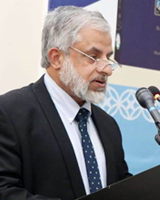
|
Remarks by the Translator
Mr. M. A. Khan
Translator of the Book
|
|
I see myself very fortunate to be given the opportunity to work on this arduous task of translating this book. It could not have been possible without the grace and blessings of Allah almighty and with the spiritual gaze of Haḍrat Sultan Bahoo as Allama Iqbal said “with the gaze of Pious Muslim (Mumin) destiny is changed.” I focused upon spiritual terms used in the book by Haḍrat Sultan Bahoo, these subtle points have to be described so that the desirous (talib) or wayfarer (salik) is not left in larch. Therefore, used new terms rather than the terms used by orientalists so that these may be closer to the essence of the original text. For example, Wahee is translated as ‘revelation’ and Ilham is also translated as revelation. I tried to separate Wahee as Divine revelation which is intended for prophet and Ilham as spiritual revelation which is intended for a Sufi. Similarly Mojhza is translated as Divine miracle attributed to Holy Prophet and spiritual miracle as karamat which can be performed by friend of Allah (Sufi). Some other traditional norms of translation are neglected as there was lack of respect when mentioning the names of pious personalities.
|
|
|
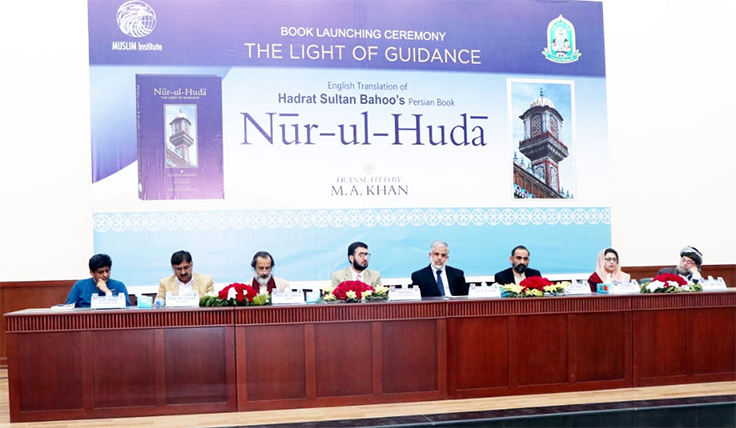
Stage view during the book launching ceremony.
|
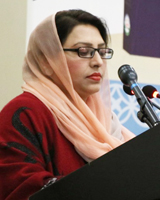
|
Guest of Honour
Dr. Uzma Zareen Nazia
Assistant Professor, Department of Persian, University of the Punjab, Lahore
|
|
Persian poetry of Haḍrat Sultan Bahoo is mesmerizing. I was honoured and surprised when the task of proof reading of Nūr-ul-Hudā was assigned to me. When I started the work, I really appreciated the skills manifested by M. A khan in its translation. When he translates the topic of “Ism-e-Allah Zaat3”, I was turned that the words and terminologies he has chosen, it means that the message of Haḍrat Sultan Bahoo was totally conveyed. In the translation of any sentence, he not only uses words of dictionary but also explains the meaning and explanation of sentences. The writer also focuses the adoption of key words to deliver the essence of the Sufi message. With the blessings of Allah Almighty, I was successful in completing this arduous work. Nūr-ul-Hudā is a great work for the intellectual world. I wish the continuation of such efforts in future.
|
|

|
Guest of Honour
Prof. Dr. Saleem Mazhar
Dean, Faculty of Oriental Learning, University of the Punjab, Lahore
|
|
Translation of such literature is really an uphill task. It requires a lot of creativity. It is even more complex than formal academic research. Only the translator can realize its significance. There are two fundamentals behind the translation of such literature. One is that the attainment of spiritual enlightenment is inevitable to translate works regarding Sufism. Blessings of Allah Almighty are more significant than hard work in this regard. In Sufi literature, it becomes difficult to define terms even in the writers’ language. Translation of an eastern language into the western one requires wisdom under the continuous guidance of Mūrshid4. One will be surprised after reading this book that spiritual terms are explained in an essential manner. Nūr-ul-Hudā' was written by Haḍrat Sultan Bahoo for the spiritual guidance of his disciples. It provides guidance to the desirous (talib) of Allah Almighty. Glossary consisted of ten pages at the end of the book is another landmark feature of this book.
|
|
|
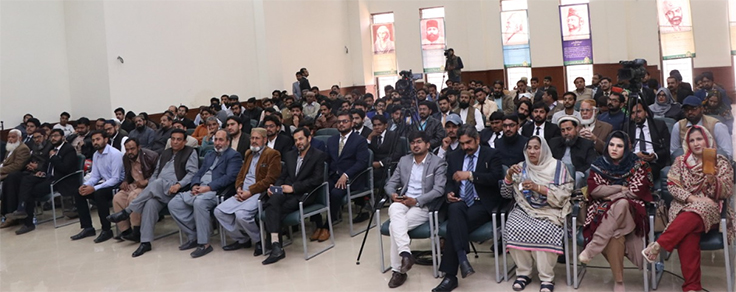
Participants view during the book launching ceremony.
|

|
Guest of Honour
Prof. Babar Naseem Assi
Persian Department, Government College University, Lahore
|
|
During the reign of Emperor Jahangir when he was at Lahore, the emperor desired to meet a dervīsh5. The emperor was told that there is one named Shah Hussain but he did not meet emperors. The emperor ordered to chase him and bring him in his court forcibly. The emperor asked him please tell me one thing that who made you dervīsh. Shah Hussain replied as a lay man cannot approach you but to whom you want to meet, you can made him present in your court by order or force or by any other mean. Same is the secret behind my becoming a dervīsh. It is the blessings of Allah Almighty who made me able to become a dervīsh. Hence, works of Sufis include special blessings and help of Almighty Allah. Haḍrat Sultan Bahoo narrates that after reading this book Naqis (impure) becomes Kamil (pure). And Kamil (complete) becomes Akmal (more purified stage of Kamil). Akmal further becomes Mūrshid who finally turns himself into the shadow of God on earth and guides humanity just like light guides one in the dark.
|
|
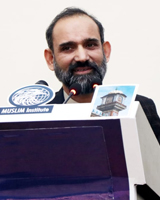
|
Guest of Honour
Dr. Tahir Hameed Tanoli
Assistant Director, Iqbal Academy of Pakistan
|
|
Translation of Sufi literature requires creativity and visionary approach towards spiritual events. It cannot be called mere literal translation rather conveying the actual sense of the Sufi narrative becomes challenging for the translator. This job becomes more difficult in the wake of diversified topics addressed by the Sufi writer. But when we look into the literature written by Haḍrat Sultan Bahoo, it secures distinctive position among other Sufi literatures. Literature written by Sufis addresses peculiar events while imparting their spiritual essence. Sufism is more about practice rather mere narrating past events. Literary work of Haḍrat Sultan Bahoo is based upon their own spiritual experiences and spiritual occurrences which are different and unique as no other Sufi scholar used these terms. Efforts by M. A. Khan are quite significant in this manner. Beauty of translation speaks clear of the reality of their dedication and hard work as well as love for Sufi tradition.
|
|
|
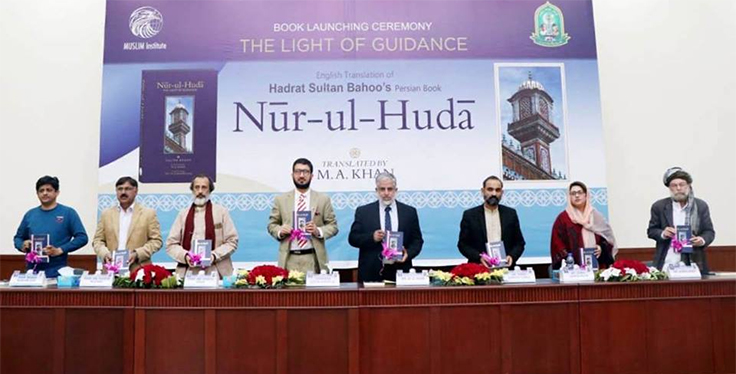
Stage view of ceremony.
|
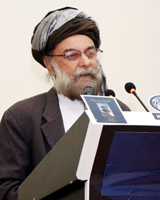
|
Guest of Honour
Dr. Ajmal Niazi
Columnist & Writer
|
|
People of Pakistan should manifest more love for Sufi mystics in order to achieve peace of mind as the same cannot be achieved without familiarity with the teachings of Sufis. In this respect, our relationship with Persian language has weakened overtime. Most of the Sufis used this language as medium of instruction to conduct their works. Sufis have been a continuous source of guidance among our societies. Anyone who is good in any language can translate but to translate and explain mystical experiences is not an easy task because merely language skills are insufficient and knowledge in spiritual dimension of Islam is paramount. There was a dire need for the literary works of Haḍrat Sultan Bahoo to be translated into English as English is a global language and for the past centuries this priceless work didn’t reach other parts of the world, particularly the English speaking world and therefore sufficient research has not been conducted in this regard.
|
|
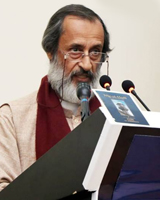
|
Remarks by the Chief Guest
Prof. Dr. Suheyl Umar
Former Director Iqbal Academy, Pakistan
|
|
Two kinds of books have been written regarding taṣawuf6 in the past one and half century. One kind is the ‘books on taṣawuf and the other one is the ‘books of taṣawuf. The book Nūr-ul-Hudā and its English translations “The Light of Guidance” falls into second type of Sufi literature which is the actual essence of Sufism or which is Sufism itself. Its topic is composed of the Nūr which is light and Hudā and these are divine metaphors which makes it unique. This book leads one through all the stages of Sufism. It guides one regarding the spiritual experience. It helps human consciousness in achieving peace of mind. Sufis regarded humans sacred irrespective of their caste, colour or creed. It was the secret behind their success in revamping their respective regions.
|
|
|
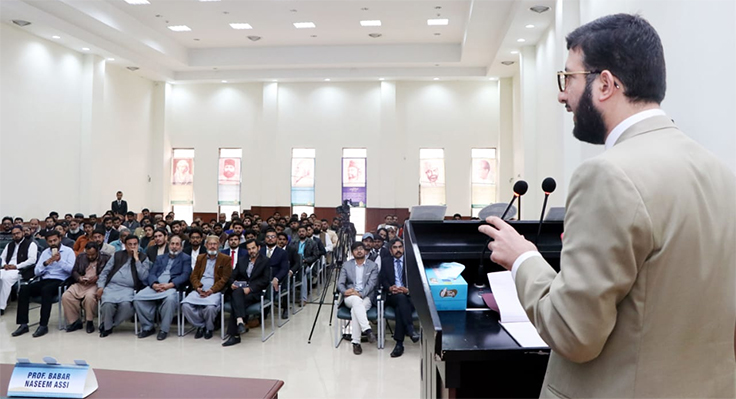
Concluding remarks by Sahibzada Sultan Ahmad Ali.
|
|
Books written by Haḍrat Sultan Bahoo are full of wisdom and knowledge. Hence, it becomes difficult for a layman to understand its essence. Some books are easy to understand but the rest cannot be understood unless one has the optimum level of interest in Sufi literature. One of the prerequisites for its understanding is that one should have the knowledge of objective behind the creation of this work. Every Sufi goes through a peculiar spiritual experience. He explains spiritual terms directly in accordance with his spiritual experience. Experiences of Haḍrat Sultan Bahoo are unique among other Sufis. In order to share his spiritual experience, Haḍrat Sultan Bahoo has used innovative terms. Sometimes, the reader feel that his experience was so wide that existing vocabulary was not enough to narrate that experience. However, Haḍrat Sultan Bahoo invented new terms in order to better explain his vast experiences. As Allama Iqbal said;
Words are but a strait-jacket for reality
Reality is a mirror, and speech the coating that makes it opaque.
|
|

|
Remarks by the Chair
Sahibzada Sultan Ahmad Ali
Chairman, MUSLIM Institute
|
|
|
Notes
1. A person who has adopted spiritual path in which he makes effort to purify his nafs
2. Ultimate stage of utmost mystical level, spiritual excellence, some if not all of orientalises describes faqr as poverty which is inaccurate in the term of spirituality, Haḍrat Sultan Bahoo states in his Persian books “when faqr perfects it doesn’t have any form of need for such he has to ask or request someone. It’s name is without want or without any need” (Mehq-ul-faqr, 339), “world is grief and faqr is the name of Allah (ﷻ)” Ibid: 261. This term could not be used in this context, detachment of spirit from all multiplicity from the mind.
3. Actual name of Allah Almighty (ﷻ)
4. Sufi master, a true mūrshid is only that person who is bestowed the state of mūrshid by the court of Rasool Allah (ﷺ)
5. Dervīsh: درویش Student of mystics
6. تصوف Sufism, spirituality which leads to purity of soul, renunciation of base-self
|
| |
|
|
|
|
|
| |
|